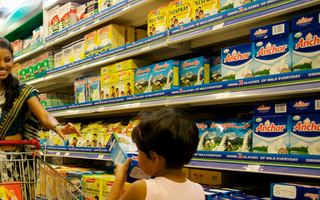 New Zealand's Fonterra, the world's largest dairy exporter, plans to sell its own branded infant milk formula in China by mid-year, playing catch-up with other global diary companies already operating in the booming, high-margin market.
New Zealand's Fonterra, the world's largest dairy exporter, plans to sell its own branded infant milk formula in China by mid-year, playing catch-up with other global diary companies already operating in the booming, high-margin market.New Zealand's biggest company already manufactures milk powder for other companies to sell in China, but has stayed out of the branded baby formula market after it was rocked by a melamine tainting scandal in 2008 which killed at least six children.
Fonterra had held a stake in Chinese dairy company Sanlu, which collapsed after it was discovered to have added melamine to bulk up its formulas. The New Zealand producer was criticised for failing to blow the whistle sooner and more loudly.
The tainting scandal destroyed consumer trust in Chinese-made milk products, creating opportunities for foreign manufacturers to grab a greater share of the huge market and command a rich premium for their products.
Baby formula consumption has increased 12-fold to about $12.4 billion in China since 2002 as mothers in an ever-expanding workforce spend less time breastfeeding.
"A safe, foreign material-based, manufactured infant formula demands a staggering premium in the Chinese market," said David Mahon, managing director of Mahon China Investment Management in Beijing, which advises Chinese and New Zealand firms.
"That's where the profit margins are."
Fonterra CEO Theo Spierings said he planned to expand the company's offerings of its Anmum maternal formula in China to include formulas for infants, toddlers and children.
"(The launch) would be in the middle of this calendar year in China," he told Reuters in an interview. Fonterra will pilot the products in smaller Chinese cities in June-July, before a wider role-out in Beijing, Shanghai and Guangzhou.
"We're going to focus on certain cities first, where we have Anmum maternal positions," he said.
Fonterra already markets the complete range of Anmum maternal and children's formulas in Malaysia and Indonesia.
Fonterra is also planning to build a plant between 2014 and 2016 which would process ultra-high temperature milk in China, where it has set up three operating dairy farms and two others under construction, Spierings said.
CLEAN, GREEN IMAGE
Experts said that the Chinese brand launch would enable Fonterra do distance itself from the melamine scandal, and emphasise the safe, high-quality reputation of New Zealand's dairy products.
"It's a logical thing for them to do ... They've always talked about adding value to their products, and this is one way they can do that," said Alan Robb, an independent commentator on co-operatives.
While domestic dairy and food companies dominate the low end of the formula market, the premium end is controlled by overseas firms including Mead Johnson and Nestle.
Chinese consumers have such low regard for home-grown dairy products that they pour across the border into Hong Kong every day to buy up milk formula tins, creating shortages and feeding anti-mainlander sentiment in the former British colony.
China imported a total of NZ$2.4 billion of whole and skim milk powder from overseas last year, 85 percent of which came from New Zealand, according to Statistics New Zealand.
Fonterra is owned by about 10,500 farmers and controls about one-third of the world's dairy exports, generating more than 7 percent of the country's gross domestic product.







